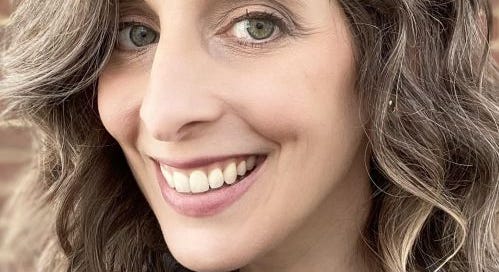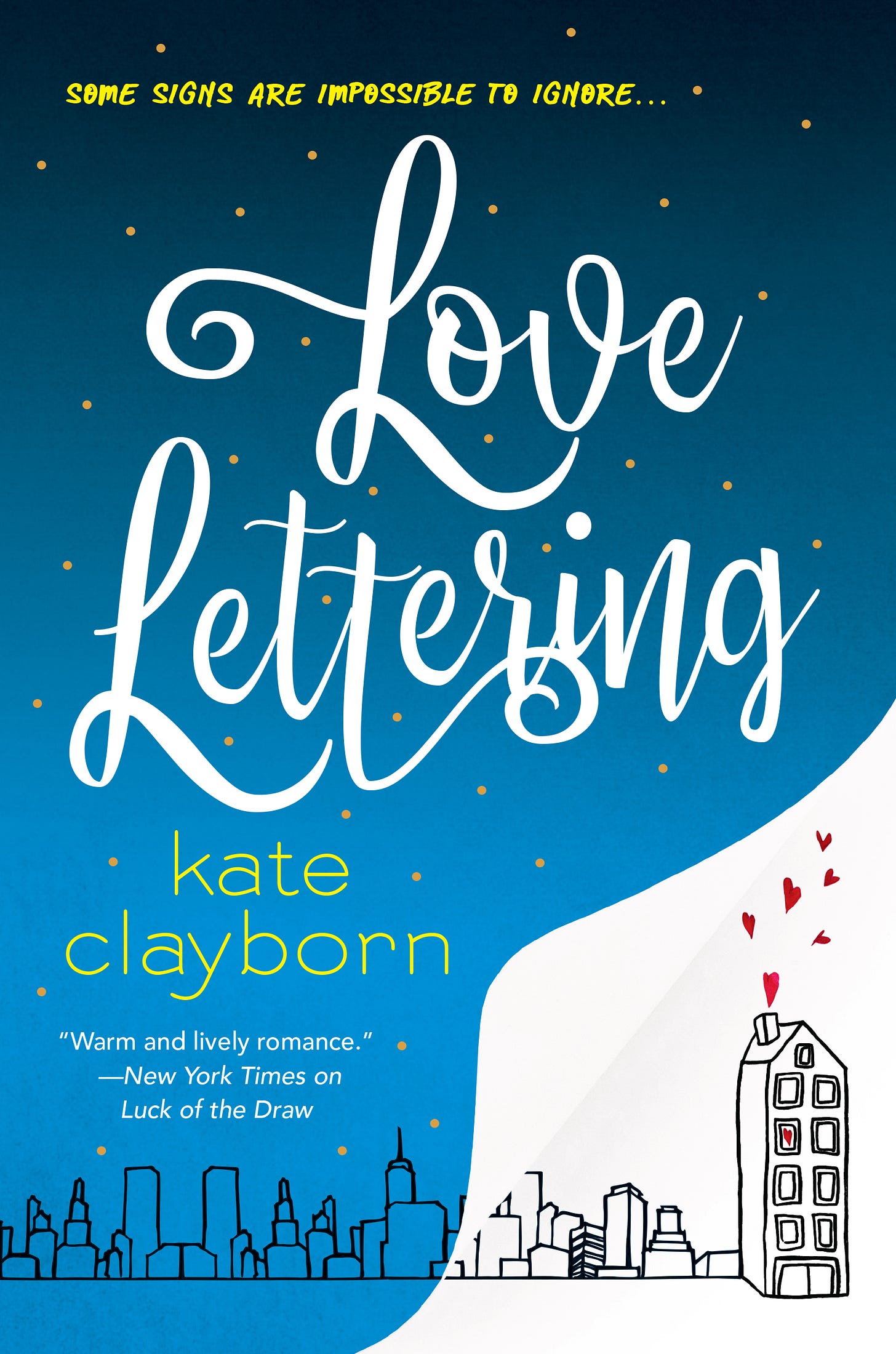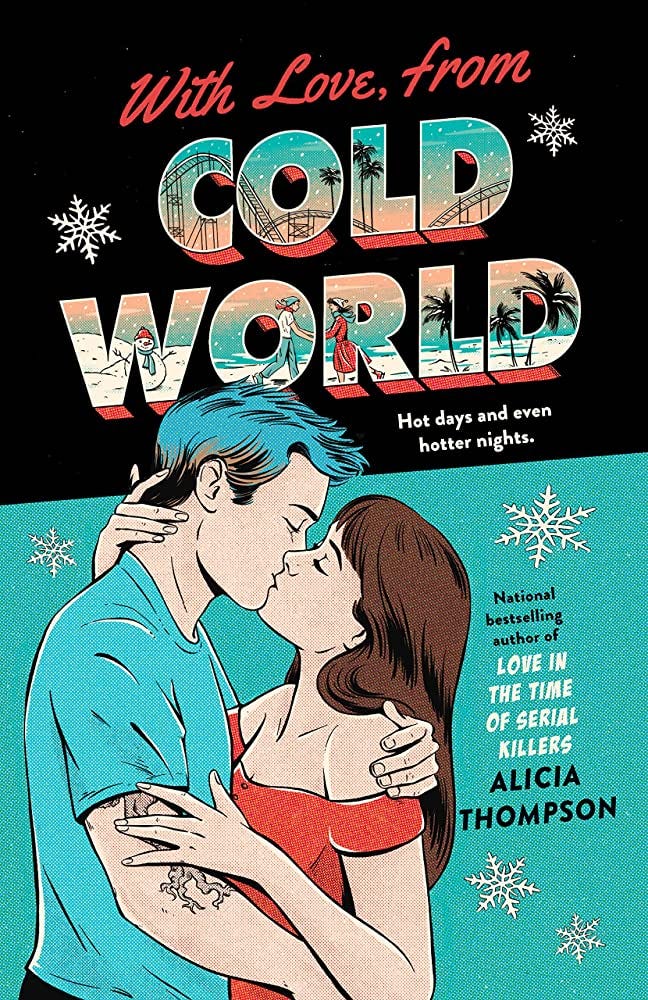Five Questions with Romance Author Kate Clayborn
We talk about her new book "Georgie, All Along"
I’ve had a Kate Clayborn book on my best-of-the-year list every year since starting this newsletter in 2020. It may only be February, but I’m willing to call it now: Georgie, All Along, Kate’s newest book, will be on my list this December.
Georgie, All Along follows Georgie Mulcahy, a longtime Hollywood personal assistant, who moves back to her small hometown after she finds herself suddenly jobless. Georgie, as Kate described, is a mess. The book opens with her carrying all her possessions — loaded in trash bags — into her parents’ home. Overwhelmed with indecision about her future, Georgie finds a "friendfic" diary, a journal she wrote in high school describing the fabulous futures she and her friends would have. She sets out to use the book as a guide to build the future she wants, but her plans hit a roadblock when she meets Levi Fanning, a former troublemaker and now loner. Levi, with his tight orderly life, is oddly compelled by Georgie’s messiness and offers to help her complete her quest.
What a joy of a book. Just like Kate’s previous works, it’s warm, but never saccharine, thoughtful and cozy.
I recently had the chance to chat with Kate after an event celebrating the launch of her new book at my neighborhood bookstore, East City Bookshop. Kate herself is the opposite of a mess, so we talked about what it took for her to write a character like Georgie, and more. Our conversation has been edited and condensed for clarity.
What was your path to writing and publishing?
I came to romance reading a bit later than a lot of my romance writing friends, who had been reading it since they were teenagers. Or their moms or grandmas read romance. I didn’t really encounter it until I was in my 20s. I had just moved away from the place where I had grown up and lived all my life. I didn’t really have friends or a community yet.
I went to my new local library and checked out a bunch books where the cover looked good. One was a blue book with a shoe on the cover, and I got in part because the writer was from Ohio, where I’m from. I guess I felt homesick. It was Jennifer Crusie’s Bet Me. [Editor’s note: this is quite possibly the platonic ideal of a contemporary romance.]
That was my first romance. What an introduction. That was my gateway. I had always written as a hobby and when I read those books, I thought this is what I’m supposed to write. I thought if I could do for just one person what those books did for me, I would feel great.
What was the process of writing Georgie, All Along like?
Every book I’ve ever written has been hard for me. It was challenging to write Georgie because I wanted the first part of the book to feel like Georgie. I wanted the reader to feel not necessarily adrift, but to feel her chaos and confusion about herself. I had to let myself be a little more free with the writing in those first couple chapters. I wanted the reader to be in the Georgie state of mind.
I required a bit of help. My editor at one point told me to open a blank document and call it ”Georgie Mulcahy is a Mess.” I would write down messy scenarios that Georgie would be in, knowing they would never be in the book, but to help me get a better sense of who she was. I needed somebody to free me in this way, to say it’s okay to do it this way.
Strong friendships are a hallmark of your books — almost as much as the love stories are. How do you balance writing both plots?
I really think friendship is as complicated as romantic love. And I think that's why I really enjoy writing about it.
When I get to the end of a romance, the happily ever after feels more complete to me if the people are surrounded by love in other forms. So, friendship is a big part of that.
When you’re writing a romance, it’s important not to overwhelm it with the friendship, so I try to make the friendships in my book reflective of the internal conflicts the characters are facing. In some ways, they’re a bridge to the happily ever after.
In Love Lettering, the book dealt with a friendship that was at a fracture point. That friendship was a symptom of the main character’s internal conflict. She’s not good at confronting areas of difficulty. She has to figure out how to deal with that friendship in order to have her love story come to fruition. In Georgie, her relationship with her childhood best friend, Bel, is part of what helps her accept herself. That was special because they’ve been friends for all these years, but have lived in different places. Georgie’s homecoming allows her to be close to her in way she hasn’t been in a long time. Those childhood friendship bonds are just so unique.
One thing that always impresses me about genre fiction writers is the ability to make a story that’s been told countless times feel fresh. How do you play within the structure and tropes while subverting them at the same time?
There’s so much to admire in the genre. The education in terms of skill is how much reading I’ve done by romance writers from different decades. Tropes become most interesting when I’m setting them alongside things in the culture that are interesting.
When I was writing Georgie, something that was on my mind was the re-evaluation a lot of people did during the worst part of the pandemic about how they spend their time, how their work affects or runs their lives. I saw a lot of people in my life questioning how much they build their identities around work.
So, with Georgie, writing a very tropey, small town homecoming romance, a thread I wanted throughout the book was Georgie reckoning with the fact that part of the reason she sees herself as a failure is that she’s never been able to define herself in terms of her work.
The lesson of the book is that’s what lovely about her. She doesn’t define herself by her work. No one should have to.
Finally, any books you want to recommend?
I've read a couple of advanced copies recently that I've really enjoyed that I would want to put on people's radars. I read a book by Alicia Thompson, author of Love in the Time of Serial Killers. She has new book coming out called With Love, From Cold World.
It’s set at a theme park called Cold World, where people in Florida can experience cold weather activities. When contemporary romances do great world building, it’s fascinating. And this novel has great world building because it’s at this very strange amusement park. It feels very real. The heroine is a buttoned-up accountant; the hero has worked at the park for a really long time, and nobody sees him beyond being the guy who’s been there forever. I loved it.
I also read Emma Barry’s Funny Guy, which comes out soon. The hero is a stand-up comedian and was childhood best friends with the heroine. It’s friends to lovers, which I think is difficult to pull off.
And then, one I’m really excited about is Tracey Livesay’s sequel to American Royalty.
Thanks to Kate for chatting! You can buy Georgie, All Along here, follow Kate on Instagram and subscribe to her newsletter.
What to Read If is a free weekly book recommendation newsletter. Need a rec? Want to gush about a book? Reply to this email, leave a comment or find me on Twitter @elizabethheld.
If you’re reading this on Substack or were forwarded this email, and you’d like to subscribe, click the button below.
Disclosure: I am an affiliate of Bookshop.org and I will earn a commission if you click through and make a purchase.








With Love, From Cold World sounds so good! That's going on my to-read list.
Love lettering was a wonderful read, looking for to Georgie!